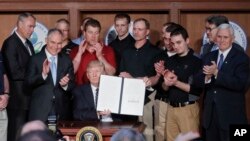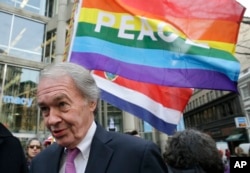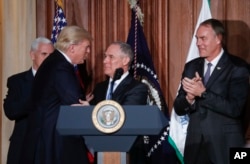President Donald Trump's move to unravel Obama-era environmental regulations, launched with great fanfare Tuesday, is attracting scorn from both ends of the political spectrum.
Concerted pushback from Democratic lawmakers and activists on the left, along with nagging doubts from conservatives skeptical of Trump's commitment to the cause, suggest that making good on one of his main campaign promises could turn into an exercise in futility.
“I am taking historic steps to lift restrictions on American energy, to reverse government intrusion and to cancel job-killing regulations,” the president said as he signed an Executive Order at the headquarters of the Environmental Protection Agency.
The response was swift and furious. “This is a declaration of war,” replied Sen. Edward Markey (D-MA). Sen. Robert Menendez (D-NJ) called it “an abdication of American leadership in the battle against climate change.”
“Trump Risks the Planet” was the editorial opinion of The New York Times.
Order fatally flawed?
On the other side of the debate, conservatives voiced concern that Trump's Executive Order is fatally flawed because it leaves in place two pillars of Obama's environmental policy: the EPA's 2009 “Endangerment Finding” which gives the agency vast authority to enforce climate-related regulations on everything from power plants to vehicle emissions; and the 2015 Paris climate treaty.
“All these policies are closely connected and striking down most, but not all, of them will not be sufficient to undo the damage done by President Obama's energy-rationing policies,” says Myron Ebell of the libertarian Competitive Enterprise Institute.
“Environmental pressure groups are already planning to file suit in federal court using the Paris treaty and the Endangerment Finding to stop Trump's executive order on power plants from taking effect,” he said.
The likelihood of lengthy litigation and the complexity of the regulatory process have brought many observers to the conclusion that while Trump's executive order may excite his base, they will do little to change Obama's Clean Power Plan, a sweeping EPA rule, already frozen by the Supreme Court, that mandates cuts in carbon emissions from power plants.
“When it comes to climate change, the Trump administration can't so easily put the genie back in the bottle,” said Scott Fulton, president of the Environmental Law Institute in Washington.
Fulton, who served as a senior EPA official in both Republican and Democratic administrations, said “Look for deep involvement each step of the way by the courts and for judicial intervention to surface as a major obstacle to implementation of the new executive order.”
Trump pauses on Paris
Environmental groups signaled that they are ready for the fight. “The safeguards Trump wants to shred — like the Clean Power Plan — are on a strong legal footing," said the Sierra Club's Michael Brune. “Trump can't reverse our clean energy and climate progress with the stroke of a pen, and we'll fight Trump in the courts, in the streets, and at the state and local level across America to protect the health of every community.”
Another looming question is the president's commitment to the landmark Paris Climate Accord signed by Obama. On the campaign trail, Trump vowed to pull out of the deal, but the realities of governing appear to have given him pause.
Early drafts of the executive order was said to have included language critical of the Paris accord. However, two of Trump's closest confidants, daughter Ivanka and Secretary of State Rex Tillerson, a former chief of the global energy giant ExxonMobil, were reported to have intervened to have references to the international agreement dropped from the final draft.
Asked Wednesday whether the president intends to withdraw from the treaty, White House spokesman Sean Spicer said, “It's still under discussion.”
Pruitt’s surprising stance
Moreover, despite Trump's public statements opposing what he called burdensome Obama-era environmental regulations, there is growing doubt about the commitment of several key members of the administration. The news website Politico reported this week that EPA Administrator Scott Pruitt, with the backing of several White House aides, successfully argued against including language in the executive order that would revoke the endangerment finding.
Pruitt's stance was surprising, as he came to national prominence for filing numerous legal challenges to EPA regulations during his time as attorney general of Oklahoma. His official biography describes him as “a leading advocate against the EPA's activist agenda.”
Politico reported that conservative members of Congress, many of them the same ones who successfully scuttled the Republican health care plan a week ago, were outraged at the news.
The latest developments have prompted conservatives to ask whether Trump himself is one of them, a question that arose repeatedly during the campaign.
Candidate Trump once famously called climate change a hoax. However, a senior White House official quizzed by reporters during a background briefing this week said the president does believe in man-made climate change.






